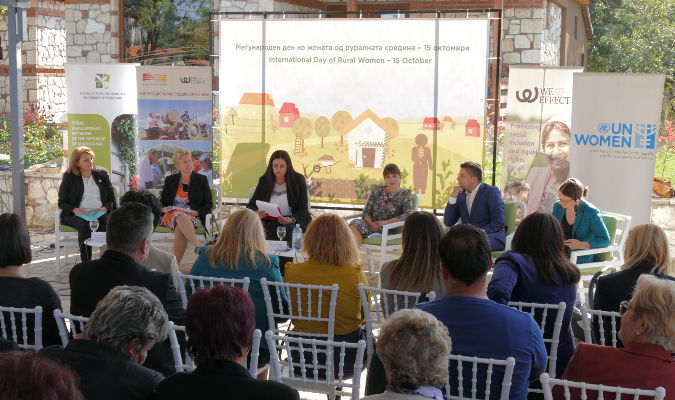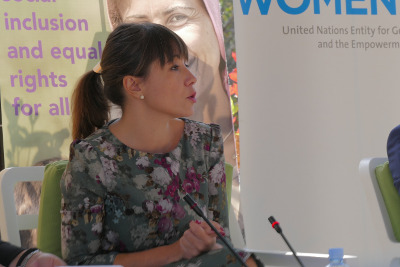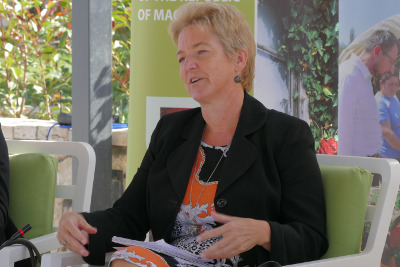Press Release: The former Yugoslav Republic of Macedonia commits to improving the social and economic development of rural women
On International Day of Rural Women, 15 October, the National Federation of Farmers and the Network for Rural Development in the former Yugoslav Republic (FYR) of Macedonia, in partnership with the Faculty for Agricultural Sciences and Food, supported by the Swedish Cooperative Centre We Effect and UN Women, organized an event to spotlight the importance of social and economic development of women living in rural areas.Date:

Ethno Village, Kuchkovo, Skopje region, 15 October 2018 - Around 120 participants, including women farmers, representatives from local self-governments, civil society and experts working in the area of rural development and empowerment of women, gathered for a public debate on “The role of women in rural areas and their challenges” on the occasion of the International Day of Rural Women – 15 October. A Declaration for improving social and economic position of women in rural areas was signed by the National Federation of Farmers, Rural Development Network, Ministry of Labour and Social Policy and Ministry of Agriculture, Forestry and Water Economy.
The aim of the event was to bring the voices of rural women to the forefront by providing them with a platform to speak about the challenges and inequalities they face and discuss measures to improve their social and economic wellbeing.
“Achieving gender equality in every part of the society, including agriculture and rural development should be taken as a serious matter,” emphasized Vaska Mojsovska, President of the National Federation of Farmers in her opening speech. She spoke about her personal experience as a woman farmer and as the first woman president of the National Federation of Farmers and stated: “I would not have been successful as a grape producer if I did not have the support from my family, in particular from my husband and my father-in-law who handed over to me the right of land ownership. This a traditional event observed every year by the National Federation of Farmers with support of We Effect. This year, we are honoured to have the support of UN Women and two Ministers joining the event to demonstrate commitment to improve the status of rural women.”

Mila Carovska, Minister of Labour and Social Policy spoke about social protection reform, which will aim to provide social services in all areas, including rural areas. “We are not using the full potential of women in rural areas to gain economic growth. Half of the women in rural areas are not visible in the labour market but are bearing unpaid care and field work,” she said.
Ljupcho Nikolovski, Minister of Agriculture, Forestry and Water Economy stated that “it is our duty and commitment to create conditions for increased participation of women in the agricultural sector. Mr Nikolovski emphasized that “today we are sending a message for joint collaboration against discrimination and harmful traditional values for the development of women in rural areas.”

Louisa Vinton, UN Resident Coordinator/UNDP Resident Representative spoke about the importance of the role of women in rural areas, their strength and strong contribution to the society. “UN Women is committed in their work to overcome the barriers that women from rural areas are facing. The findings from UN Women study will provide guidelines in overcoming these barriers,” she noted. Ms. Vinton emphasized that “we, as the UN, work in many fields, such as creating job opportunities, collaborating with municipalities from rural areas on improving living conditions, damage reduction from natural disasters where women are more affected. This is made in order to achieve the key message from the SDGs – leave no one behind.”
Biljana Dzartova-Petrovska, Senior Programme Manager at the Embassy of Sweden to FYR Macedonia stated that “when gender equality is strengthened, the poverty is reduced. Economic empowerment of women, respect for women reproductive rights and fight against violence against women are issues for intensive collaboration with local partners”.
“Women need solidarity. Mutual support is much needed in achieving results. We at We Effect have gender equality in the heart of our work – it is our starting and finish line,” said We Effect Senior Gender Advisor, Sian K. Maseko.
The second part of the event was dedicated to a panel discussion on the role of women in rural areas and their challenges. Led by Biljana Petrovska Mitrevska, from the National Federation of Farmers, the guest speakers - Vangelina Parmachka, woman farmer, Nada Simovska, member of the Network for Rural Development, assis. prof. Marina Nacka, Ph.D. Frosina Georgievska, member of the National Federation of Farmers, and Zaklina Jovanovska, Mayor of Municipality of Staro Nagorichane, spoke about different challenges that women from rural areas face, such as access to health services, employment opportunities and maternity leave for women farmers, access to information and education, harmful gender stereotypes and patriarchal values.
During the panel discussion, preliminary findings of the first study for Measuring the level of empowerment of women in agriculture were presented. The study is a result of the cooperation between UN Women and Faculty of Agricultural Science and Food and aims to provide policy recommendations for engendering national rural and agricultural development policies.